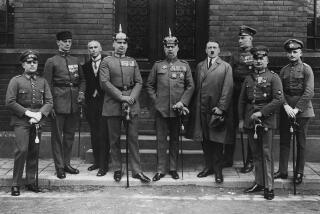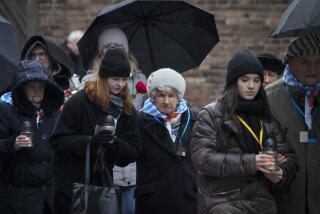Marcel Reich-Ranicki dies at 93; influential German literary critic
Marcel Reich-Ranicki, who grew up in Poland and Nazi Germany, survived the Warsaw ghetto and went on to become postwar Germany’s best-known literary critic, has died. He was 93.
Reich-Ranicki died Wednesday in Frankfurt, according to the Frankfurter Allgemeine Zeitung newspaper, where he led the literature section for 15 years. It gave no more details.
The sharp-tongued Reich-Ranicki established himself as West Germany’s premier arbiter of literary taste after arriving with no money in 1958 from communist Poland, where he had served as a diplomat and intelligence agent in the late 1940s.
Reich-Ranicki didn’t shy away from hard-biting criticism of authors, saying once that “clarity is the politeness of the critic; directness is his obligation and his job.” In his 1999 memoirs, “My Life,” he conceded that he had a reputation as “a man of literary executions.”
Initially part of the left-leaning literary circle known as Group of 47, along with Nobel laureate Guenter Grass, Reich-Ranicki wrote for the weekly Die Zeit, then moved to the conservative-minded Frankfurter Allgemeine daily from 1973 to 1988. After that, he became the star of ZDF public television’s “Literary Quartet,” a popular book program.
Reich-Ranicki was by turns supportive and critical of Grass — with whom he fell out for a time after describing one of Grass’ books as “a complete failure.”
Reich-Ranicki was born into a Jewish family in Wloclawek, Poland, on June 2, 1920. When he was 9, his family moved to Berlin after the bankruptcy of his father’s construction company.
In Berlin, Reich-Ranicki went to high school, but by the time he wanted to attend a university to study German literature in 1938, the Nazis had come to power and he was denied entry because he was Jewish. He was deported to Poland.
After Nazi Germany’s invasion of Poland in 1939, Reich-Ranicki, like other Jews, was soon forced to live in the Warsaw ghetto. There, he worked as an interpreter for the ghetto’s Jewish administrative council.
In February 1943, he and his new wife, Teofila, whom he called Tosia, escaped the ghetto to avoid deportation to the Nazi death camps. A typesetter and his wife on the outskirts of Warsaw hid them in their house during the day. At night, they made cigarettes, which the typesetter sold. This continued until the Red army arrived the next year.
Reich-Ranicki’s parents and brother were killed in the Holocaust. His sister, Gerda, and her husband escaped to England from Germany shortly before the war.
Having survived the war, Reich-Ranicki joined Poland’s communist party. He said he and his wife credited their survival to the Red army and that communist ideas appeared “very attractive” at the time. But after returning from his stint as the Polish consul in London and as an agent with Poland’s fledgling intelligence service, he was briefly detained and kicked out of the party amid the increasingly repressive atmosphere of the late 1940s.
Disillusioned in part by an upturn in anti-Semitism, he decided not to return to Poland in 1958 from a study trip to West Germany; his wife and son, who had already flown to London, joined him there. She died in 2011, and he is survived by their son, Andrew.
Born Marcel Reich, he took the name Ranicki when he worked for the Polish government in London after the war. He shifted to Reich-Ranicki when he launched his career as a critic in West Germany.
Reich-Ranicki never denied having been a member of Poland’s communist party, but became embroiled in an argument about his past in 1994 when, after a German television report, he had to acknowledge having worked for Polish intelligence. He had previously criticized some East German intellectuals for not coming clean about their alleged ties to their country’s secret police.
More to Read
Start your day right
Sign up for Essential California for the L.A. Times biggest news, features and recommendations in your inbox six days a week.
You may occasionally receive promotional content from the Los Angeles Times.






